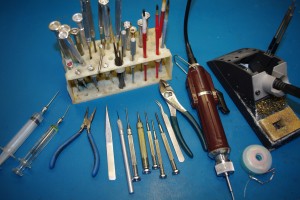
Have you ever heard the expression “having a paint brush and paints doesn’t make you a painter� Camera repair requires basic hand tools such as screwdrivers, needle nose pliers, tweezers, and a host of electronic testing and specialized tools, most of which are readily available to the general public. But to become a camera repair technician, it takes more than tools. A repair technician of any kind must have an aptitude for mechanical and electronic systems if he or she wants to succeed. For me, this came fairly easy because growing up I loved to take things apart to figure out how they worked. The challenge of putting it all back together in working order was something I loved just as much.
This curiosity of mine began with taking apart devices like wind up clocks, watches, electric motors, and later, radios. I would take the radios apart and found no moving parts except the tuning and volume controls, but it also had little parts on a board. I wondered to myself “what makes this thing tick?†As my curiosity grew, I moved to the TV with its glowing glass tubes. Once I even got hold of a lawnmower engine and took every single part out of it. I put it all back together and low and behold, I actually got it started again, although it smoked quite a bit! Looking back, I probably gouged the piston rings and cylinder walls with my screwdriver trying to get the piston back in. I also enjoyed building electronic kits from Radio Shack and reading any electronic book I could get my hands on.
My high school had an excellent electronics lab and an automotive bay with lifts so I took full advantage of the classes offered. In those classes I began to develop my formal mechanical skills as well as knowledge of how parts of a car work together. After graduation I joined the military where I learned power generation and moved on to radio repair. My first job outside of the military was as an automotive mechanic which I did for a year. From there I got into the electronics industry for a few years and eventually found the ultimate electro-mechanical job for a major camera manufacturer. I remember the advertisement reading: “Photographic Technician Needed†and “Will Train the Right People.†I had always been interested in photography and felt very optimistic about this opportunity. Long story short, I applied, got the job, and was trained by their factory service personnel.
 Starting out, I worked on 35mm film SLRs and lenses and quickly moved on to repairing 35mm film point-and-shoots. There is never really an end to learning as a repair technician (if you want to continue to be one anyhow) and over the years I learned more and more film auto-focus SLRs and eventually professional medium format cameras. My goal has been, and continues to be, to fix things the right way, the first time. I’d like to think that the awards I’ve won for “Best Quality Technician†and “Most Efficient Technician†throughout the years are due to that.
Starting out, I worked on 35mm film SLRs and lenses and quickly moved on to repairing 35mm film point-and-shoots. There is never really an end to learning as a repair technician (if you want to continue to be one anyhow) and over the years I learned more and more film auto-focus SLRs and eventually professional medium format cameras. My goal has been, and continues to be, to fix things the right way, the first time. I’d like to think that the awards I’ve won for “Best Quality Technician†and “Most Efficient Technician†throughout the years are due to that.